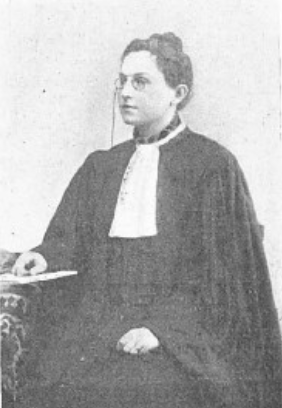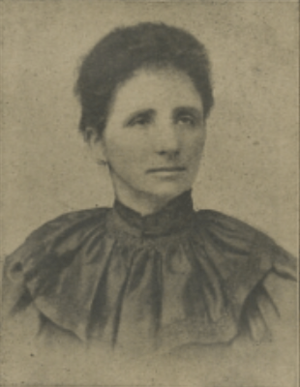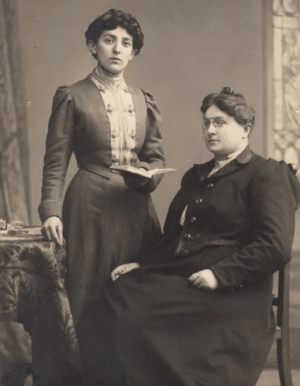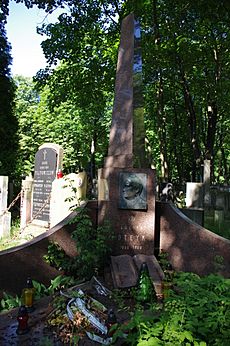Józefa Joteyko facts for kids
Quick facts for kids
Józefa Joteyko
|
|
|---|---|

Joteyko at her 1896 graduation
|
|
| Born |
Józefa Franciszka Joteykówna
29 January 1866 Poczujki, Kiev Governorate, Russian Empire
|
| Died | 24 April 1928 (aged 62) |
| Nationality | Polish |
| Other names | Jósefa Joteyko, Joséphine Joteyko |
| Occupation | physician, scientist and academic |
| Years active | 1896–1927 |
Józefa Joteyko (born January 29, 1866 – died April 24, 1928) was an important Polish scientist. She studied how the body works (physiologist), how the mind works (psychologist), and how people learn (pedagogue). She was also a dedicated researcher.
Józefa studied at the University of Geneva and then went to medical school in Brussels. She finished her medical degree in Paris in 1896. For a short time, she worked as a doctor in France. However, she soon realized she loved research more. So, she moved to Brussels to work at the Solvay Institute of Physiology. There, she taught and researched how muscles and the brain get tired.
Joteyko believed that science could help solve problems in society. She looked into how science could make life better for workers. She also studied how schools could help students learn their best. She became the president of the Belgian Neurological Society in 1904. She won many awards for her research. In 1916, she made history by becoming the first woman to lecture at the famous Collège de France.
After Poland became independent again in 1919, Joteyko returned home. She taught at several institutes in Warsaw. She even became the director of the Pedagogical Institute for a while. She continued to advise the government on jobs and education. In 1926, she earned another degree from the University of Warsaw. Józefa Joteyko is remembered as one of the people who helped create Poland's modern school system.
Contents
Early Life and Education
Józefa Franciszka Joteykówna was born on January 29, 1866. Her family lived in a village called Poczujki, which was then part of the Russian Empire. Today, this village is in Ukraine. Her parents were Karolina and Lucjan Joteyko. Her family was part of the Polish upper class and known for being smart.
Józefa and her siblings grew up on their family's large estate. To get a better education, her family moved to Warsaw in 1873. Józefa first studied at home with her mother and a French tutor. In 1876, she briefly attended the Sierakowska Boarding School. But her mother felt the science teaching was not good enough.
At that time, the only other option was a government school. These schools forced students to learn Russian culture. So, Józefa's mother arranged for private Polish professors to teach her at home. After seven years, Józefa was ready to become a private teacher. She spoke four languages and passed most tests. However, she failed the Russian language exam. Instead of retaking it, she decided to study abroad. Women were not allowed to study at the University of Warsaw then.
In 1886, Joteyko went to Geneva, Switzerland, where her uncle lived. She enrolled at the University of Geneva to study science. While there, she changed her style, cutting her hair short and wearing more tailored clothes. She met Michalina Stefanowska, who became her close friend and work partner. After two years, Józefa earned her science degree.
In 1889, she and her family moved to Brussels. Józefa began studying medicine at the Free University of Brussels. In 1890, her father became ill, and her family returned to Warsaw. Józefa, however, moved to Paris, where Stefanowska was studying.
Soon after, her father died, and the family faced money problems. Józefa went to Saint Petersburg to help. She managed to save some of the family's money. With her share, she returned to Paris and shared an apartment with Stefanowska. Józefa continued her medical studies at the University of Paris. In 1896, she earned her medical degree. She even won an award for her paper on muscle fatigue.
Scientific Career and Contributions
Research in France and Belgium
For two years, Joteyko worked as a doctor in Paris. But she found the daily routine boring. In 1898, she moved to Belgium to work at the Solvay Institute of Physiology. She also taught experimental psychology at the Casimir Laboratory in Brussels. By 1903, she was the director of the Casimir Laboratory.
Joteyko published many papers on how the body works. She researched how anesthesia affects muscles and nerves. She was very interested in how muscles and the brain get tired. She worked on ways to measure fatigue accurately. Her scientific work earned her many awards. She received prizes from important groups like the Imperial and Royal Academy of Brussels and the French Academy of Sciences.
In 1904, Joteyko became the president of the Belgian Neurological Society. In 1906, Michalina Stefanowska, her long-time friend, left Paris to return to Poland. Joteyko was sad about this, but Stefanowska wanted to teach again. They promised to write letters and visit often.
Even though she continued her research, Joteyko also started teaching about how children learn (pedagogical psychology). She taught at teacher training schools. In 1908, she started and edited a journal called Revue Psychologique. This journal looked at new ideas in psychology from a scientific and educational point of view. Through this work, she met Varia Kipiani, a young scientist from Georgia. They worked together and researched vegetarianism, which they both followed. They won an award for this work in 1908. Joteyko also organized summer seminars where scientists from around the world discussed child development.
Joteyko, like other reformers, believed that science could solve problems in society. She was a strong supporter of women's rights. She thought all jobs should be open to both men and women. She used scientific methods to study social issues. For example, by measuring physical and mental tiredness, she suggested that military training could be shorter. She also studied workers to find ways to make industries more efficient. She believed that pay should be based on how much effort a job required, not on things like gender. These studies led her to research how schools could use science to help students reach their full potential.
In 1911, Joteyko organized a big international meeting about child development in Brussels. The next year, she started the International Paedological Faculty of Brussels. This was a special school for studying children. Kipiani worked there as a lab assistant. Maria Grzegorzewska, who later became a famous Polish educator, came to study with Joteyko in 1913. Joteyko became Grzegorzewska's mentor, and they became lifelong friends.
When World War I started, Joteyko's research was interrupted. She focused on helping people instead. She founded a committee to help Poles living in Belgium. In 1915, she left Belgium and moved to Paris with Grzegorzewska.
In 1916, Joteyko was invited to teach at the Collège de France. This was a huge honor, as she was the first woman ever to lecture at this 386-year-old institution. Her first lecture was on January 24, 1916. She also taught at the Sorbonne and the University of Lyon. She continued to win many awards for her work. During the war, many Polish thinkers were living outside Poland. They were preparing to rebuild their country once it was independent. In 1918, Joteyko and Grzegorzewska started the Polish Teaching League. Their goal was to gather information on education to help build new schools in Poland.
Returning to Poland
In 1919, after Poland became independent again, Joteyko returned to Warsaw with Grzegorzewska. She tried to get a job at the University of Warsaw, but she was turned down. Joteyko believed this was because some Polish scientists did not want women in their field. Also, she lived with other women partners, which was unusual at the time.
Grzegorzewska found a job helping to develop special education in Poland. She helped Joteyko find work as a lecturer at the National Pedagogical Institute and the National Institute of the Deaf in Warsaw. A year later, Joteyko became the head of the General and Pedagogical Psychology Department at the Institute. She brought her lab equipment from Brussels to set up a workshop. She taught students to measure skills like hand movements and reaction times. She also taught them to use important tests like the Binet-Simon intelligence test.
In 1921, Joteyko joined the editorial team of the Pedagogical Yearbook. The next year, she became vice-chair of the Pedagogical Commission for the Ministry of Education. At that time, Poland did not have a standard school system. Schools often favored wealthy students. Joteyko strongly argued for education for everyone. She suggested free schooling for poor students and scholarships for talented ones. She believed that all students, no matter their background, should be able to learn. This would benefit society as a whole.
She suggested that all students should go to school until age 14. Then, tests would help decide if they should go to university or a trade school. She also thought students should be tested again at 18. Joteyko believed that all teachers should be well-trained. This would allow students in trade schools to change their career paths if they wanted.
Joteyko wanted to make education fair for everyone. She pushed for special education classes and schools for students with disabilities. She believed these schools should meet the unique needs of these students. She also thought schools should not teach religion. She felt religion was a personal choice and that schools should promote tolerance. She also believed every school should have a psychologist. This psychologist would guide students and collect scientific information to improve teaching methods. Many of her ideas were included in the Polish constitution of 1921, though not all teachers agreed with them at first.
From 1922, Joteyko taught at the State Institute of Special Education, which Grzegorzewska had organized. She also led the Polish group at international meetings on moral education. In 1926, after the Pedagogical Institute closed, she began teaching at the Free Polish University. However, she could not do research there because it had no lab. Joteyko gave her last lecture in 1926. She also started a new psychology journal, Polish Archives of Psychology, and became its editor. In 1927, she joined committees for the Economic Ministry and the Ministry of Labor. Also in 1926, she completed her post-doctoral degree in medicine at the University of Warsaw.
Later Life and Legacy
In the late 1920s, Joteyko developed a serious heart condition. Her friend Maria Grzegorzewska took care of her. Józefa Joteyko died on April 24, 1928, in Warsaw. She was buried in the Powązki Cemetery. Important leaders like Józef Piłsudski and Ignacy Mościcki attended her funeral.
When she died, Joteyko was highly respected for her work. Along with Marie Curie, she was one of the most famous Polish scientists in the world. She is also remembered as a leader in changing education in Poland. Her ideas about education included caring for students' physical and mental health. She also believed in well-trained teachers who could inspire learning.
Joteyko published 262 works and left many research papers. During her life, she was a member of many important scientific groups. These included the Royal Society of Medical and Natural Sciences of Brussels and the Belgian Neurological Society. She was also an honorary member of the Academy of Physics and Chemistry in Palermo. Towards the end of her life, she led the Polish Society of Psychotechnics, which studied how to apply psychology to practical problems. Today, an elementary school in Grodzisk Mazowiecki and a middle and high school in Kraków are named after her.
 | Lonnie Johnson |
 | Granville Woods |
 | Lewis Howard Latimer |
 | James West |




